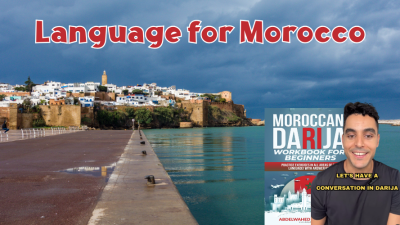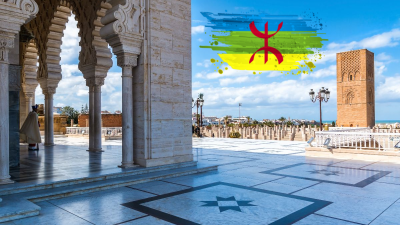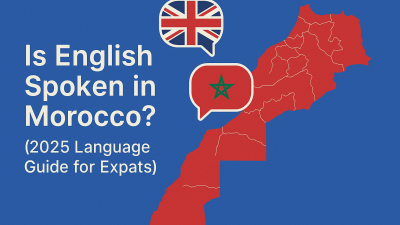So, you’re thinking about moving to Morocco — maybe for a few months, maybe forever. Whether you’re planning to retire in Agadir, live your digital nomad life in Marrakech, or just explore the culture for a while, one thing is certain: language matters.
You’ve probably heard that people speak Arabic in Morocco. But wait until you hear a local conversation — it’s fast, full of French and Amazigh words, and unlike anything you’ve learned in a textbook. So, what’s really going on?
This guide breaks it all down, so you know exactly what languages are spoken in Morocco, where they’re used, and how they’ll impact your daily life.
1. Modern Standard Arabic – The Formal Language You’ll See Everywhere
Let’s start with the basics. Modern Standard Arabic (MSA) is Morocco’s official language — the one you’ll find in government documents, news broadcasts, and classrooms. It’s the formal Arabic used across the Arab world, often referred to as Fus-ha.
But here’s the thing: nobody speaks it at home. You’ll hear it in parliament or see it on national TV, but if you try using it in a market or taxi, you might just get a smile and a reply in… something else entirely.
So, it’s good to understand MSA, especially for reading signs or filling out official forms. But don’t expect it to carry you through day-to-day conversations.
2. Moroccan Arabic (Darija) – The Real Spoken Language
Welcome to Darija — the language of the streets, the cafes, the souks, and the taxis. It’s Morocco’s real-life, spoken Arabic. And yes, it’s wildly different from MSA.
What makes Darija unique?
- It borrows from Classical Arabic, but it’s way faster and more flexible.
- It’s infused with words from French, Spanish, and Amazigh.
- It changes depending on where you are: Marrakchi Darija sounds different from the one in Tangier.
Here are a few Darija survival phrases:
| English | Darija |
|---|---|
| Hello | Salam |
| How are you? | Labas? |
| Please | 3afak |
| Thank you | Shukran |
| I don’t understand | Ma-fhemtch |
| How much is this? | Bsh-hal hadi? |
Pro tip: Learn just 20–30 useful Darija phrases and locals will open up. It builds respect, shows effort, and helps you avoid being overcharged in the market.
3. Amazigh (Berber) Languages – Ancient, Proud, and Still Alive
Roughly 35–40% of Moroccans speak an Amazigh (or Berber) language, and it’s a big part of Morocco’s identity — especially in the countryside and mountain regions.
There are three main Amazigh dialects:
- Tachelhit (Soussi): Common in southern Morocco — Agadir, Taroudant, Ouarzazate.
- Tamazight: Spoken in the Middle Atlas.
- Tarifit: Found in northern Morocco, especially in the Rif mountains.
Since 2011, Amazigh has been recognized as an official language of Morocco alongside Arabic. It’s taught in public schools and used in national media. You’ll also see signs in Tifinagh script, the beautiful and ancient Amazigh alphabet.
Want to impress your Amazigh neighbors? Try these:
| English | Tachelhit |
| Hello | Azul |
| Thank you | Tanmirt |
| Yes / No | Ih / Oho |
Even just learning a few words can earn big smiles in Amazigh-speaking areas.
4. French – The Language of Business, Law, and High School Textbooks
Thanks to Morocco’s colonial past, French is still everywhere. It’s not an official language, but it sure feels like one in banks, hospitals, schools, and government offices.
Where will you encounter French in Morocco?
- In paperwork — like rental contracts, bank forms, or SIM card agreements.
- At clinics and hospitals — where many doctors speak fluent French.
- In upscale restaurants, business meetings, and private schools.
If you speak French, you’re golden. If you don’t, no stress — Google Translate helps a lot. But knowing a few French basics will make life smoother:
| English | French |
| Where is the embassy? | Où est l’ambassade ? |
| I need a doctor | J’ai besoin d’un médecin |
| How much does it cost? | Combien ça coûte ? |
Many educated Moroccans are bilingual in French and Arabic, and some will switch between the two in the same sentence. It’s just part of the culture.
5. English – On the Rise
Here’s the good news for English speakers: English is growing fast in Morocco.
You’ll hear it more and more among:
- Young people (especially in high schools and universities)
- Freelancers and remote workers in IT, design, or marketing
- Tourism staff in hostels, hotels, riads, and travel agencies
Where to find English speakers:
- Major cities like Marrakech, Casablanca, Rabat, Agadir
- Coworking spaces, digital nomad cafes, and expat hubs
- Social media communities and meetups
That said, don’t expect everyone to speak fluent English — especially in government offices or rural areas. A translation app can be your best friend.
6. Code Switching – Morocco’s Linguistic Superpower
Here’s something truly fascinating: Moroccans don’t just speak one language at a time — they blend them.
It’s called code switching, and it’s everywhere. A sentence might start in Darija, drop a few French terms, and end in English. Like this:
“Kat-hdr m3aya b français oula b Darija?” (Are you talking to me in French or Darija?)
You’ll get used to it. It’s part of the fun — and part of what makes Morocco so linguistically rich.
7. Language by Region – Who Speaks What Where?
Let’s break it down so you know what to expect city by city:
| Region | Main Spoken Languages |
| Rabat | Arabic, French, growing English |
| Casablanca | French, Darija, some English |
| Marrakech | Darija, French, tourist English |
| Tangier | Darija, French, Spanish |
| Agadir | Tachelhit (Amazigh), Darija |
| Fes | Arabic, Darija |
| Ouarzazate | Amazigh (Tachelhit), French |
Each region has its own flavor, but the combo of Darija + French will usually get you through.
8. Final Thoughts: What Language Should You Learn?
If you’re coming to Morocco long-term — whether to live, work, or retire — here’s the smart play:
- Start with basic Darija: For markets, cabs, neighbors, and casual chats
- Learn some French: For paperwork, banking, hospitals, and formal life
- Use English: In digital nomad spaces, tourism, and among younger people
Bonus tip: Flashcards, YouTube videos, and language apps (like Drops, SayHi, or Anki) make learning easy.
FAQs: Languages in Morocco
Q1: Can I get by with English only in Morocco?
In tourist areas and coworking spaces — yes. But outside of that, especially with government offices or landlords, it’ll be tough without Darija or French.
Q2: Is French still used in schools?
Yes, especially in private schools and in subjects like science or math. Public schools teach in Arabic, but French is still strong.
Q3: Are Amazigh languages hard to learn?
They can be, yes — but even learning a few words can make locals smile and feel respected. Most locals will appreciate your effort!
Q4: Do young Moroccans speak English?
Yes, increasingly. Many teens and students speak decent English, especially in cities.
Q5: Should I learn Arabic or Darija first?
Skip Modern Standard Arabic unless you’re doing formal studies. Start with Darija — it’s what people really speak in daily life.


